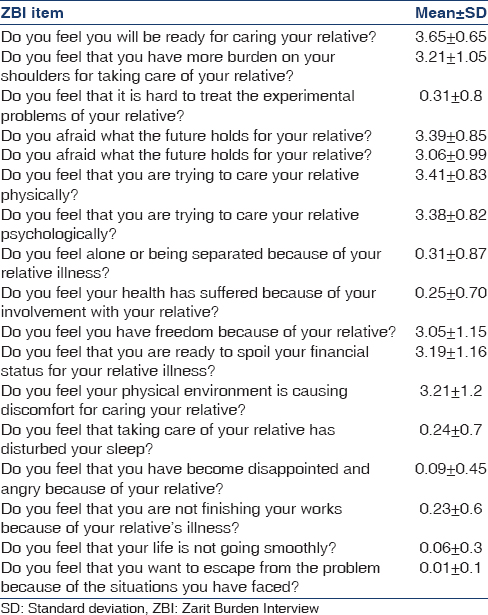Translate this page into:
Assessment of burden among caregivers of hemodialysis patients at a Tertiary Care Hospital of Andhra Pradesh
Address for correspondence: Dr. S.A.A. Latheef, Department of Biochemistry, School of Life Sciences, University of Hyderabad, Hyderabad - 500 046, Telangana, India. E-mail: yakheen@gmail.com
This is an open access article distributed under the terms of the Creative Commons Attribution-NonCommercial-ShareAlike 3.0 License, which allows others to remix, tweak, and build upon the work non-commercially, as long as the author is credited and the new creations are licensed under the identical terms.
This article was originally published by Medknow Publications & Media Pvt Ltd and was migrated to Scientific Scholar after the change of Publisher.
Sir,
One hundred caregivers of hemodialysis patients, aged 20–65 years, attending a tertiary care hospital were evaluated for psychological burden using Zarit Burden Interview (ZBI) instrument after obtaining their consent.[1] Caregivers, other than family members (relatives, friends, and children below 20 years) were excluded. The ZBI contains 22 items focusing on caregiver's health, psychological well-being, finances, social life, and the relationship between the caregiver and the patient.[2] In this study, five items (3, 11, 12, 14, and 17) with a corrected item-total correlation value of <0.3 were deleted. The total burden score was classified as little burden to no burden (0–20), mild to moderate burden (21–40), moderate to severe burden (41–60), and very severe burden (61–88).
Most caregivers were young (53%), female (84%), homemakers (84%), married (86%), following the Hindu religion (85%), living in rural areas (42%), and in nuclear families (78%). A higher percentage of caregivers had a school education (28%), family income of Rs. 5000/month (68%), and were spouses of the patient (45%). The validity of the instrument was done by Cronbach's alpha and was found to be 0.7. The score ranged from 12 to 44 [Table 1]. A higher percentage of caregivers (85%) had reported mild to moderate burden. A higher mean burden score was observed in males than female caregivers (34.31 ± 3.30 vs. 30.42 ± 6.05, P < 0.05). Earlier studies had observed an association of burden score with age.[34] In a univariate regression analysis, statistically significant association between total burden score and male caregivers (standardized beta coefficient 0.244, P < 0.01) was observed. This indicates that more attention needs to be paid on male caregivers for reducing the burden among them.

No association was observed between burden score and duration of dialysis. This may due to the short duration of hemodialysis. The average duration of hemodialysis was 1 year. A high caregiver burden score is expected with an increased duration of disease. In our study, the majority of the caregivers were either spouses or parents and, therefore, it is possible that caregivers will not feel a burden in attending their immediate relative. This is confirmed by mild to moderate burden score in the majority of the caregivers. The dialysis patients were either government employees or beneficiaries of state government scheme NTR Vaidya Seva. Employees are reimbursed and those covered under the NTR Vaidya Seva scheme, avail the procedure free of cost. We feel that this may also be one of the reasons for not finding the association of burden score with duration of illness, as the caregivers need not be concerned about the financial resources. There is no consensus in literature on the association of caregiver burden score and duration of disease. One study had not found any association[4] while other found decreased burden score with an increase in the duration of disease.[5] This is only a pilot study. Studies on the caregivers of longer duration dialysis patients may clarify on the association between caregiver burden and duration of disease, which we intended to carry out.
Financial support and sponsorship
Nil.
Conflicts of interest
There are no conflicts of interest.
References
- Relatives of the impaired elderly : c0 orrelates of feelings of burden. Gerontologist. 1980;20:649-55.
- [Google Scholar]
- Validity and reliability of the Zarit Burden Interview in assessing caregiving burden. Ann Acad Med Singapore. 2010;39:758-63.
- [Google Scholar]
- Burden on caregivers as perceived by hemodialysis patients in the frequent hemodialysis network (FHN) trials. Nephrol Dial Transplant. 2011;26:2316-22.
- [Google Scholar]
- Subjective burden on family carers of hemodialysis patients. Open J Nephrol. 2014;4:79-85.
- [Google Scholar]
- The care burden and the affecting factors of individuals receiving hemodialysis treatment. TAF Prev Med Bull. 2014;13:99-108.
- [Google Scholar]






